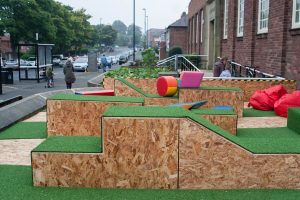On Wednesday 25 January, the School hosted a participatory workshop reflecting on the use of communities within recent policy agendas. It considered the emphasis placed on “localism” over the last nine years, the forces driving it at the national level and how it has been interpreted in northern, urban locations. It also asked how a localism agenda might be reworked to better reflect the needs of these areas.
The event was organised by Dr David Webb of the School, with partners Greening Wingrove and the CHAT Trust, and funded by the Newcastle Institute for Social Renewal and the Global Urban Research Unit. This participatory workshop is the latest output of their collaborative partnership, building on their project Reclaim the Lanes which worked with residents of an area surrounding a back lane in the Arthur’s Hill area of Newcastle.
The workshop proved extremely popular, around 85 people attended from local authorities, charities, community interest companies, Newcastle and Northumbria Universities, consultancies and arts organisations.
The morning was structured around several presentations with time for panel and table discussions. After an introduction to the themes from Dr Webb, he and Caroline Emmerson (CHAT Trust) presented their work on Reclaim the Lanes. Caroline Gore-Booth (Giroscope Ltd) talked about collaborating around self-help housing in Hull and after some initial reflections, Alan Barlow (WEA Greening Wingrove Project) presented Wingrove’s community innovation fund. Armelle Tardiveau (Newcastle University) and Cllr Marion Talbot (Newcastle City Council) talked about their experiences of co-designing Fenham’s Pocket Park.
Read the morning presentations at the links below:
- Dr David Webb Introduction (slides) and Introduction (notes)
- Reclaim the Lanes (slides) and Reclaim the Lanes (notes)
- Caroline Gore Booth Giroscope
- Alan Barlow WEA Greening Wingrove
- Fenham DIY Streets and Pocket Park
- Annabel Davidson Knight Collaborate
The morning panel discussion was led by a presentation from Annabel Davidson Knight (Collaborate CIC) which reflected on early attempts in Oldham to use public services to support community action. She described their intention to create a virtuous circle, with learning and feedback generated from community hubs being used to adapt and update the way services were provided locally.
The afternoon presentations also focused on the use of community hubs, with Tony Durcan (Newcastle City Council) explaining the importance of digital for reducing the cost of service delivery in the city, and setting out Newcastle’s support offer for those who find it difficult to use digital technology unaided. Mark Cridge (MySociety) then explained the use of Fix My Street as a way of encouraging more efficient and transparent reporting of environmental problems. Rob Webb (Transmit Enterprise CIC) described the potential benefits of the Poverty Stoplight system and Pete Wright (Newcastle University) set out the work they have been doing to promote digital civic technologies in Newcastle. An interesting discussion was had on the use of digital to promote a culture change in public services, including the sometimes unseen benefits of face to face communication and the dangers that innovation might be driven primarily by austerity.
Read the afternoon presentations at the links below:
- Tony Durcan Newcastle City Council
- Mark Cridge My Society
- Robert Webb Transmit Enterprise
- Peter Wright Digital Civics
The event allowed for the sharing of experiences of community work from around the region, with numerous insights being offered during the morning panel session. Many of the themes raised were also relevant to Newcastle City Council’s policy cabinet meeting, which directly followed on from the event. Despite the huge challenges presented by austerity, it was interesting to reflect on the variety of responses being taken both by community organisations and local authorities. The experiences of Oldham and elsewhere show that creative ways of promoting joint working are emerging, and that future reflection on these may have much to offer for the way we seek to manage our cities and neighbourhoods.
Dr David Webb is Lecturer in Town Planning and Director of Engagement in the School
david.webb@ncl.ac.uk



